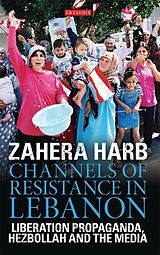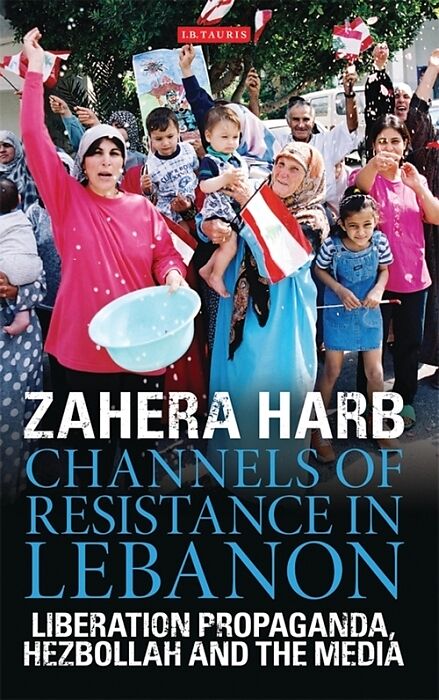Channels of Resistance in Lebanon
Einband:
Kartonierter Einband
EAN:
9781848851214
Untertitel:
Liberation Propaganda, Hezbollah and the Media
Genre:
Politikwissenschaft
Autor:
Zahera Harb
Herausgeber:
Bloomsbury Academic
Anzahl Seiten:
288
Erscheinungsdatum:
30.03.2011
ISBN:
978-1-84885-121-4
Informationen zum Autor Zahera Harb is a Lebanese journalist and academic. She teaches media studies for the Department of Culture, Film and Media at Nottingham University. She has more than ten years' experience as a journalist in Lebanon, working for Lebanese and international media organisations. She started as a news reporter and distinguished herself in the coverage of war operations in the battleA eld in south Lebanon. She is a member of the consultancy team of Thomson Foundation, UK, conducting media training for Arab journalists in and outside the Arab World. She is also a review editor for 'Journal of Media Practice'. Klappentext The South Lebanon conflict saw two decades of sustained resistance by the Lebanese to the Israeli occupation. The Lebanese media's role in achieving liberation over this period is significant, through campaigns conducted to unify the Lebanese people against their foreign occupier and in support of the Lebanese resistance in South Lebanon. This book investigates the culture and performance of Lebanese journalism in this setting. It is a story about journalism told by a journalist who is also using tools of scholarship and research to narrate her story and the story of her fellow journalists. Zahera Harb is also presenting here an alternative interpretation of propaganda under conditions of foreign occupation and the struggle against that occupation. She identifies the characteristics of 'liberation propaganda' through the coverage and experience of the two Lebanese TV stations Tele Liban and Al Manar within the historical, cultural, organisational and religious contexts in which they operated, and how these elements shaped their professional practice and their news values.Author identifies the characteristics of 'liberation propaganda' through the coverage and experience of the two Lebanese TV stations Tele Liban and Al Manar within the historical, cultural, organisational and religious contexts in which they operated, and how these elements shaped their professional practice and their news values. Zusammenfassung Author identifies the characteristics of 'liberation propaganda' through the coverage and experience of the two Lebanese TV stations Tele Liban and Al Manar within the historical, cultural, organisational and religious contexts in which they operated, and how these elements shaped their professional practice and their news values. Inhaltsverzeichnis 1 Introduction2 Propaganda Definitions and Techniques3 Ethnography and Journalism Culture4 Overview of the Arab/Israeli Conflict5 The Media in Lebanon6 Tele Liban Coverage, April 1996: grapes of unity facing grapes of wrath7 Liberation Media: Hezbollah & Al Manar, 1997-2000Reflection: Achieving Liberation PropagandaBibliographyNotesIndex...
Vorwort
Author identifies the characteristics of 'liberation propaganda' through the coverage and experience of the two Lebanese TV stations Tele Liban and Al Manar within the historical, cultural, organisational and religious contexts in which they operated, and how these elements shaped their professional practice and their news values.
Autorentext
Zahera Harb is a Lebanese journalist and academic. She teaches media studies for the Department of Culture, Film and Media at Nottingham University. She has more than ten years' experience as a journalist in Lebanon, working for Lebanese and international media organisations. She started as a news reporter and distinguished herself in the coverage of war operations in the battleA eld in south Lebanon. She is a member of the consultancy team of Thomson Foundation, UK, conducting media training for Arab journalists in and outside the Arab World. She is also a review editor for 'Journal of Media Practice'.
Klappentext
The South Lebanon conflict saw two decades of sustained resistance by the Lebanese to the Israeli occupation. The Lebanese media's role in achieving liberation over this period is significant, through campaigns conducted to unify the Lebanese people against their foreign occupier and in support of the Lebanese resistance in South Lebanon. This book investigates the culture and performance of Lebanese journalism in this setting. It is a story about journalism told by a journalist who is also using tools of scholarship and research to narrate her story and the story of her fellow journalists. Zahera Harb is also presenting here an alternative interpretation of propaganda under conditions of foreign occupation and the struggle against that occupation. She identifies the characteristics of 'liberation propaganda' through the coverage and experience of the two Lebanese TV stations Tele Liban and Al Manar within the historical, cultural, organisational and religious contexts in which they operated, and how these elements shaped their professional practice and their news values.
Inhalt
1 Introduction 2 Propaganda Definitions and Techniques 3 Ethnography and Journalism Culture 4 Overview of the Arab/Israeli Conflict 5 The Media in Lebanon 6 Tele Liban Coverage, April 1996: grapes of unity facing grapes of wrath 7 Liberation Media: Hezbollah & Al Manar, 1997-2000 Reflection: Achieving Liberation Propaganda Bibliography Notes Index

Leider konnten wir für diesen Artikel keine Preise ermitteln ...
billigbuch.ch sucht jetzt für Sie die besten Angebote ...
Die aktuellen Verkaufspreise von 6 Onlineshops werden in Realtime abgefragt.
Sie können das gewünschte Produkt anschliessend direkt beim Anbieter Ihrer Wahl bestellen.
Loading...
Die aktuellen Verkaufspreise von 6 Onlineshops werden in Realtime abgefragt.
Sie können das gewünschte Produkt anschliessend direkt beim Anbieter Ihrer Wahl bestellen.
| # | Onlineshop | Preis CHF | Versand CHF | Total CHF | ||
|---|---|---|---|---|---|---|
| 1 | Seller | 0.00 | 0.00 | 0.00 |
